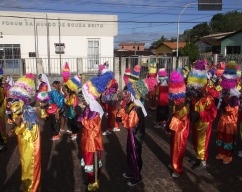Recognizing customs and traditions
Residents of the Bahia Southern Lowlands communities celebrated the days of Historical Heritage and Folklore in the region on August 17 and 22, respectively
1 de September de 2011
Residents of the Bahia Southern Lowlands communities celebrated the days of Historical Heritage and Folklore in the region on August 17 and 22, respectively
1 de September de 2011

As the streets gained new colors, the participants began smiling. From afar, the sound of different types of drums, including friction drums, and giant cowrie shells. In the middle of the crowd, someone says: “The Zambiapunga group is heading this way!” Masked men, coming from three Bahia municipalities – Nilo Peçanha, Cairu and Taperoá – joined together for a major celebration: the meeting of Zâmbias. There are hundreds of people who, with the different colors of their clothing, transmit the good energy and joy and invite the community to join the party. “This was a unique moment in the history of the Zambiapunga group. We have made a great dream come true!” said Master Deco, responsible for the Taperoá group.
The cultural expression is part of the programming for the Cultural Parade, an event designed to celebrate the Historical Heritage and Folklore Days in the Bahia Southern Lowlands on August 17 and 22, respectively. The action was coordinated by Bahia Southern Lowlands Sustainable Development Institute (IDES), one of the institutions supported by the Odebrecht Foundation, and involved the entire region, which also includes the municipalities of Maraú, Presidente Tancredo Neves, Ibirapitanga, Camamu, Piraí do Norte, Igrapiúna, Ituberá and Valença.
The initiative was designed to raise the communities’ awareness as to the importance of material and immaterial heritage and the preservation of cultural identity. “Recognizing the expressions and natural wealth of our region is essential, since it reinforces the relationship between the past and present,” said Elder do Rosário, a student of the Training Course in Agroforest Systems held at the Agroforest Family Home.
For two days, presentations, seminars, walks, theater and conversations with the community were the highlights. The activities were supported by the city governments, Municipal Departments of Culture, Education, Social Action, Tourism, Agriculture, Sports and Communication, local teaching units, the Industry Social Service (SESI) – Valença and the Bahia Artistic and Cultural Heritage Institute (IPAC). “The celebration indicates to us that a society’s soul is found in its culture and that every citizenship process takes place through social living,” said Liliana Leite, Executive Director of IDES. “I congratulate the entire team involved in promoting this cause.”
Days of Celebrations
The event began in Maraú, where, on the morning of August 17, the party earned new dimensions with Mandu, a local performance group, which was accompanied by the Lira da Conceição Philharmonic Orchestra. In Presidente Tancredo Neves, residents began their activities with a “Folkloric Breakfast,” consisting of foods made from manioc, such as cookies and the traditional beiju. Organizers of the project “I Love
Being a Child” livened up the younger public from Ibirapitanga and, in Camamu, a crowd participated in a guided tour to the Historical Site.
At the start of the afternoon, Piraí do Norte hosted the Heritage Education Seminar, with lectures on the municipality’s history and its cultural wealth, in addition to presentations of the musical genres Terno de Reis and Samba de Roda. Finally, Igrapiúna sparked the interest of the local youth with the auditorium program Young Art, which promoted debates on heritage and social vulnerability. “These actions
help build citizenship, especially among youth,” said Gilson Santos, Principal of the Luís Rogério de Souza State High School, located in Camamu.
Cairu began the programming for the second day with the Gosto de álcool (“Taste of Alcohol”) Philharmonic Orchestra, which invited the community to dance and sing traditional Carnival songs and walk along the city’s historical streets. “Even the cobblestones themselves showed the culture of the municipality of Cairu,” said Antônio Isaías do Rosário Ribeiro, Secretary of Culture. In Ituberá, participants visit the Jesuit Walking Trail, which dates back to 1759. Interesting facts and discussions were part of the walk. Taperoá and Valença closed the Cultural Parade with seminars and educational walks.
“Valuing our history strengthens us to consolidate the sustainable development of a people who know how to recognize the past to construct the future,” said Pedrina Belém do Rosário, communication coordinator at IDES and a direct supporter of the event.
The Cultural Parade is an event on the calendar of activities promoted by institutions associated with the Bahia Southern Lowlands Environmental Protection Area Mosaic Integrated and Sustainable Development Program (PDIS). The idea is to build the relationship between the different PDIS communities and communicate the main results and challenges. This year, there will also be celebrations for Tree Day, Children’s Day and Black Awareness Day.
Do you wish to be
a partner in our projects, make
a donation or hire our technical consulting?
Send a message
right now!